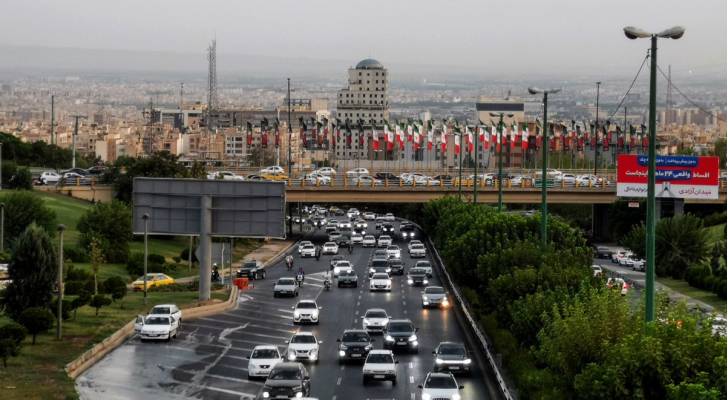Cars drive on a motorway in southern Tehran (Credit: AFP)
Iran grapples with navigation chaos as GPS jamming continues
Nearly two months after the end of Iran and 'Israel’s' unprecedented 12-day war, daily life in Tehran remains unsettled by widespread GPS disruptions that continue to paralyze transportation and digital services, according to a report by Agence France-Presse (AFP).
For drivers like 35-year-old Farshad Fooladi, who relies on Iran’s popular ride-hailing platform Snapp, the chaos has been devastating. “For weeks I have been unable to work,” he said. “Most of the time was wasted wandering around aimlessly.”
- Disruptions across Iran -
GPS signals began to falter shortly after 'Israel' launched its surprise attack in mid-June, sparking the conflict. Iran’s communications ministry later admitted the interference was deliberate, citing “security and military purposes” without further explanation.
Satellite navigation systems are often critical for guiding missiles, rockets, and drones, prompting Iran to use jamming or spoofing tactics in the past, especially near military facilities. But this episode marks the most prolonged and widespread disruption to date, leaving businesses, commuters, and even emergency services in disarray.
Basic navigation tools such as Google Maps and Iran’s local mapping service Neshan have been hit particularly hard. Users in Tehran frequently find their locations misplaced by hundreds of kilometers, while some delivery and transport apps have nearly collapsed.
“To get around, you either need a sharp memory for routes or already know the city well,” Fooladi explained. Originally from Lorestan province, he admits he now avoids passengers unfamiliar with the capital’s streets, a choice that has drastically cut into his income.
- Economic impact deepens -
In August, Neshan’s chief executive Javad Amel revealed that the app’s daily user activity had fallen by up to 20 percent, attributing the decline to persistent spoofing. The disruptions, layered onto an economy already battered by decades of sanctions and mismanagement, have intensified public anxiety.
“This war has upended our lives and frozen our future plans,” Fooladi said.
The Khabar Online news agency recently warned that the interference has caused “collateral damage” to Iran’s digital economy and even public safety, noting delays to critical services like ambulances.
Former communications minister Mohammad Javad Azari Jahromi also questioned the effectiveness of the tactic. “Drone manufacturers and operators are not stupid either. If the GPS is disrupted and another positioning system replaces it, they will also use the new system,” he argued on his Telegram channel.
- Searching for alternatives -
Iranian officials are now weighing whether to migrate away from GPS entirely. Deputy communications minister Ehsan Chitsaz suggested adopting China’s BeiDou satellite navigation system, which became fully operational in 2020 and is seen as a rival to the US-operated GPS.
“Disruptions are created by domestic systems on GPS, and this has pushed us toward alternative options such as BeiDou,” Chitsaz told the Iranian daily Ham Mihan. He confirmed that plans are being drafted to gradually shift location-based services in transport and agriculture to the Chinese network.
But experts warn such a move would be complicated. “Doing so would require extensive and costly infrastructure changes,” said Amir Rashidi of the US-based Miaan group, adding that Iran remains “highly vulnerable in cyberspace.”
- Uncertain future -
The continued technological disruptions come against a backdrop of stalled nuclear talks with Washington and fears of renewed conflict. 'Israel' and the US have repeatedly threatened further military action should Iran restart its nuclear program.
For many Iranians, the uncertainty is unbearable. “Everything is uncertain, and we can’t plan. The future is unclear,” said Mohammad Hossein Ghanbari, a 32-year-old Snapp driver. “We don’t know whether the war will break out again or what will happen next.”




